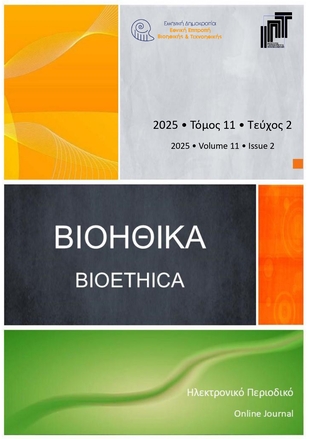Μεταμοσχεύσεις μήτρας – Σκέψεις σχετικά με το νομικό πλαίσιο, την πρόσβαση των τρανσέξουαλ γυναικών και τα ηθικά ζητήματα

Περίληψη
Οι μεταμοσχεύσεις μήτρας (UTx) κερδίζουν γρήγορα δημοτικότητα ως μέθοδος τεχνητής αναπαραγωγής. Αφορούν μια χειρουργική επέμβαση κατά την οποία μια υγιής μήτρα μεταμοσχεύεται από ένα άτομο σε ένα άλλο. Μέχρι σήμερα, οι διαδικασίες UTx έχουν πραγματοποιηθεί σε γυναίκες με ταυτότητα φύλου (cisgender) που αντιμετωπίζουν κάποιο είδος υπογονιμότητας. Αν και αυτή η διαδικασία δεν προσφέρεται επί του παρόντος ως συνήθης θεραπεία σε καμία χώρα παγκοσμίως, είναι απαραίτητο να προσδιοριστούν τα βασικά ηθικά και νομικά ζητήματα, προκειμένου να καθοριστεί εάν οι ισχύοντες νόμοι για τη μεταμόσχευση οργάνων είναι κατάλληλοι ή εάν απαιτείται νέα νομοθεσία. Θα υποστηρίξω ότι η μέθοδος αυτή έχει ιδιαίτερη πολυπλοκότητα, που απαιτεί ένα ξεχωριστό σύνολο νομοθετικών διατάξεων. Η ειδική νομοθεσία για την UTx θα συμβάλει στην καταπολέμηση των ανισοτήτων και στην πρόληψη του εξαναγκασμού σε διεθνές επίπεδο.
Λεπτομέρειες άρθρου
- Πώς να δημιουργήσετε Αναφορές
-
Santos Pinero, D. I. (2025). Μεταμοσχεύσεις μήτρας – Σκέψεις σχετικά με το νομικό πλαίσιο, την πρόσβαση των τρανσέξουαλ γυναικών και τα ηθικά ζητήματα. Βιοηθικά, 11(2), 93–106. https://doi.org/10.12681/bioeth.42846
- Ενότητα
- Ανασκοπήσεις

Αυτή η εργασία είναι αδειοδοτημένη υπό το CC Αναφορά Δημιουργού 4.0.
Οι Συγγραφείς που δημοσιεύουν εργασίες τους σε αυτό το περιοδικό συμφωνούν στους παρακάτω όρους:
- Οι Συγγραφείς διατηρούν τα Πνευματικά Δικαιώματα και χορηγούν στο περιοδικό το δικαίωμα της πρώτης δημοσίευσης, ενώ ταυτόχρονα τα πνευματικά δικαιώματα της εργασίας προστατεύονται σύμφωνα με την Creative Commons Attribution CC BY 4.0, που επιτρέπει άμεση πρόσβαση στις εργασίες και κάθε χρήστη να διαβάζει, να κάνει λήψη, να αντιγράφει, να διανέμει, να εκτυπώνει, να αναζητά, ή να συνδέει με το πλήρες περιεχόμενο των άρθρων, να τα αναζητά για ευρετηρίαση, να τα χρησιμοποιεί ως δεδομένα σε λογισμικό, ή να τα χρησιμοποιεί για οποιοδήποτε άλλο νόμιμο σκοπό. Προϋπόθεση ε΄ιναι η αναφορά στον αρχικό δημιουργό/ούς και την αρχική δημοσίευση σε αυτό το περιοδικό.
- Οι Συγγραφείς μπορούν να συνάπτουν ξεχωριστές, και πρόσθετες συμβάσεις και συμφωνίες για την μη αποκλειστική διανομή της εργασίας όπως δημοσιεύτηκε στο περιοδικό αυτό (π.χ. κατάθεση σε ένα ακαδημαϊκό καταθετήριο ή δημοσίευση σε ένα βιβλίο), με την προϋπόθεση της αναγνώρισης και την αναφοράς της πρώτης δημοσίευσης σε αυτό το περιοδικό.
Το περιοδικό Βιοηθικά επιτρέπει και ενθαρρύνει τους συγγραφείς να καταθέτουν τα δημοσιευμένα άρθρα σε θεσμικά (π.χ. το αποθετήριο του Εθνικού Κέντρου Τεκμηρίωσης) ή θεματικά αποθετήρια (π.χ. αποθετήριο SSOAR για τις Κοινωνικές Επιστήμες), μετά τη δημοσίευσή τους στο περιοδικό «Βιοηθικά» και με όρους Ανοικτής Πρόσβασης, όπως κατά περίπτωση προσδιορίζονται από τους χρηματοδότες της έρευνάς τους ή/και τα ιδρύματα με τα οποία συνεργάζονται.
Κατά την κατάθεση της εργασίας τους, οι συγγραφείς πρέπει να παρέχουν πληροφορίες σχετικά με τη δημοσίευση του άρθρου στο περιοδικό «Βιοηθικά» και τις πηγές χρηματοδότησης της έρευνάς τους.
Κατάλογοι των ιδρυματικών και θεματικών αποθετηρίων ανά χώρα υπάρχουν στη βάση http://opendoar.org/countrylist.php . Οι συγγραφείς έχουν τη δυνατότητα να καταθέσουν χωρίς κόστος την εργασία τους στο αποθετήριο www.zenodo.org, το οποίο υποστηρίζεται από το OpenAIRE (www.openaire.eu ), στο πλαίσιο των πολιτικών της Ευρωπαϊκής Επιτροπής για την ενίσχυση της Ανοικτής ακαδημαϊκής έρευνας.


